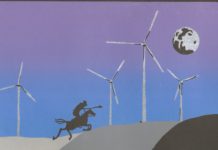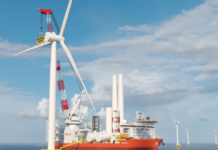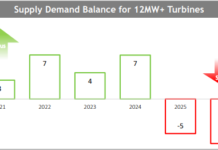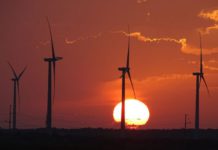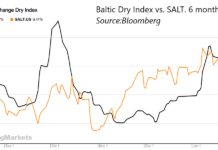Tom Konrad CFA
Owning a wind farm is about to become a lot less risky.
Wind power is cheap, clean, uses no water, and emits no pollutants. Yet wind is far from a perfect source of electricity, since the wind blows when and where it will.
While wind power will never be as constant as baseload power, geographic diversification and better dispatch procedures can go a long way to mitigate the problems to utilities caused by wind’s variability. Yet wind farm developers and financiers are at the mercy of the weather in their particular location. Not only does wind output swing significantly from day to day and season to season, wind output can also vary greatly from year to year. Farm owners also have to worry that some of their turbines might need maintenance just when the winds are at their best. This can lead to unpredictability of wind farm revenues, which in turn makes wind farms more expensive to finance.
Two recent announcements go a long way to solving these problems for wind farm developers and owners.
First, on May 19th, energy risk analysis leader 3TIER and weather risk management firm Galileo announced that they would be offering financial products to hedge the risk of wind variability. With cash payouts based on 3TIER’s leading wind resource data, Galileo can offer to mitigate the cost to wind farm developers for a premium which can be expected to be much less than the risk premium charged by project financiers who do not have the expertise to assess wind resource risk as well as Galileo and 3TIER, and who also seldom have large and geographically diverse enough portfolios of wind investments to accept such risks at a price that is affordable for many wind farm developers.
Second, General Electric (GE) announced on May 23rd that they will be offering production based availability (PBA) guarantees as an option for new and existing operations and maintenance contracts on all GE 1.5 and 2.5 megawatt series wind turbines. Not only will this remove a level of risk and make wind farms cheaper to finance, but it is also likely to be a competitive advantage for GE Wind, which recently slipped into third place by market share behind Chinese manufacturer Sinovel Wind Group (601558.SS). While first place Vestas Wind Systems (VWDRY.PK) might be able to offer comparable guarantees, I can’t see bankers putting much faith in the strength of a production guarantee from the Chinese firm, especially after their recent dust-up with American Superconductor (AMSC).
Together, these two financial innovations could do as much to reduce the cost of wind power and increase the pace of wind farm development as years’ worth of technical innovation developing better wind turbines.
This article was first published on the Green Stocks blog at Forbes.com.
DISCLOSURE: None
DISCLAIMER: Past performance is not a guarantee or a reliable indicator of future results. This article contains the current opinions of the author and such opinions are subject to change without notice. This article has been distributed for informational purposes only. Forecasts, estimates, and certain information contained herein should not be considered as investment advice or a recommendation of any particular security, strategy or investment product. Information contained herein has been obtained from sources believed to be reliable, but not guaranteed.

